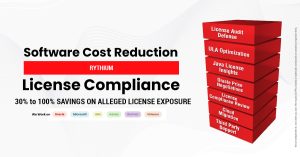The Importance of Conducting an Oracle License Review: Mitigating Risks and Maximizing Savings
For organizations relying on Oracle software, managing licenses can be a complex and daunting task. Oracle’s licensing agreements are notoriously intricate, and with frequent changes to licensing terms, understanding exactly how many licenses an organization holds and whether it is compliant with its agreements can be a challenge. Failing to keep track of Oracle licenses can expose a company to substantial financial and legal risks. Oracle software license audits can bring in huge unexpected and unbudgeted financial exposures.
Conducting a proactive Oracle license review is crucial for avoiding these risks, ensuring compliance, and optimizing costs. This article will delve into the dangers of Oracle license non-compliance, common issues that lead to non-compliance, and how a thorough license review can help businesses save money and mitigate risks.
Dangers of Oracle License Non-Compliance
Non-compliance with Oracle’s licensing agreements can be costly, and companies that neglect to manage their licenses properly may face the following dangers:
1. Financial Penalties and Backdated Fees
Oracle conducts regular license audits, often referred to as License Management Services (LMS) audits. These audits are designed to ensure that customers are using Oracle products in line with their licensing agreements. If an audit reveals that an organization has exceeded the terms of its licenses, it can result in hefty financial penalties.
In cases of non-compliance, Oracle may require companies to purchase additional licenses retroactively. This could include backdated support fees, which can add up quickly. The costs associated with license compliance violations can range from tens of thousands to millions of dollars, depending on the extent of the non-compliance.
2. Legal Action
In extreme cases, if a company is found to be using Oracle software without proper licenses, Oracle may initiate legal action. This can lead to costly lawsuits, damage to the company’s reputation, and disruptions to business operations.
3. Business Disruption
During an audit, Oracle may require the company to cease using certain software until compliance is restored. This can result in interruptions to critical business processes, affecting productivity and revenue. Additionally, legal battles or license negotiations can divert valuable resources away from business operations.
4. Loss of Negotiation Leverage
When a company is found to be out of compliance, it loses leverage in negotiating with Oracle for future contracts. Oracle may require the organization to purchase additional licenses at full cost, and the opportunity to negotiate better terms may be limited. Additionally, being under the microscope of an audit often forces companies into reactive purchasing, which is rarely cost-effective.
Issues that Create Oracle License Non-Compliance
Several factors contribute to Oracle license non-compliance, most of which stem from the complexity of Oracle’s licensing rules and the dynamic nature of modern IT environments. Common issues include:
1. Misunderstanding Licensing Metrics
Oracle uses various licensing metrics, such as Processor licensing, Named User Plus (NUP) licensing, and licensing for cloud environments. Processor licenses are based on the number of cores in a server, while NUP licenses are based on the number of individual users who access the software.
Understanding how these metrics apply to a company’s specific hardware and software environments is critical. Many companies miscalculate the number of licenses they need due to a misunderstanding of these metrics. For instance, organizations running Oracle software on multi-core servers or in virtualized environments may under-license their deployments if they fail to account for all processor cores properly.
2. Virtualization and Cloud Deployment Complexities
Virtualization and cloud environments are a particular source of confusion. Oracle has stringent rules about how its software can be deployed in virtualized environments, and many organizations assume they can use Oracle’s software on virtual machines (VMs) without purchasing additional licenses for each core in the underlying hardware. This assumption can result in substantial under-licensing.
Similarly, Oracle’s licensing policies for cloud environments differ from traditional on-premises deployments. For example, if a company deploys Oracle software on a third-party cloud provider such as AWS or Azure, it must comply with Oracle’s cloud licensing rules. Many organizations fail to recognize these differences and unintentionally exceed their licenses.
3. Overlooking Indirect Usage
Indirect usage occurs when third-party applications access Oracle databases or software. Even if a user is not directly accessing Oracle software, they still require a license if they interact with an application that pulls data from an Oracle system.
Many organizations overlook indirect usage, leading to non-compliance. For example, if an enterprise application accesses an Oracle database on the back end and hundreds of users interact with that application, all those users may require Oracle licenses.
4. Inadequate Tracking and Documentation
Over time, organizations accumulate multiple licenses and agreements as they expand their use of Oracle products. Without centralized tracking and documentation, it becomes challenging to manage these licenses effectively.
Mergers, acquisitions, and organizational restructuring can exacerbate the issue, as licenses and software deployments may become dispersed across various business units. Companies that fail to keep detailed records of their licenses and how they are being used are more likely to fall into non-compliance.
5. Failure to Account for Software Sprawl
Oracle software is often deployed in multiple environments, such as production, development, and testing. These deployments may increase over time as business needs evolve. Without strict controls and oversight, companies may inadvertently exceed their licensed usage limits. Software sprawl is particularly common in large enterprises with complex IT infrastructures.
How a Proactive Oracle License Review Helps
Conducting a proactive Oracle license review is the most effective way to prevent non-compliance and mitigate the risks associated with Oracle licensing. A license review offers the following benefits:
1. Identifying and Rectifying Non-Compliance Early
A thorough Oracle license review allows organizations to assess their current usage against their existing licenses. By identifying any areas of non-compliance early, companies can take steps to rectify the situation before Oracle conducts an audit. This can include purchasing additional licenses, decommissioning unused software, or reconfiguring environments to ensure compliance.
Addressing non-compliance proactively gives businesses more control over the process, allowing them to avoid costly penalties and backdated fees. Moreover, resolving compliance issues before an audit allows for more favorable terms and less scrutiny from Oracle.
2. Optimizing License Usage
A license review not only helps companies identify areas of non-compliance but also offers opportunities for optimization. By reviewing how Oracle software is deployed and used, businesses can often identify instances where they are over-licensed or paying for software they no longer need.
For example, if Oracle software is deployed across multiple servers or environments that no longer require it, those licenses can be redeployed elsewhere in the organization or decommissioned entirely, reducing unnecessary costs.
3. Gaining Clarity on Cloud and Virtualization Licensing
As businesses increasingly migrate to the cloud and adopt virtualized environments, a license review can provide clarity on how Oracle’s licensing rules apply to these modern deployment models. Understanding the nuances of Oracle’s cloud licensing policies can prevent over-purchasing or under-licensing, ensuring that businesses get the most value from their cloud investments.
4. Centralizing License Management
A proactive license review allows organizations to consolidate and centralize their Oracle licensing information. By creating a centralized repository of all Oracle licenses, agreements, and deployments, companies can streamline license management and ensure that they have complete visibility into their software usage.
Centralized license management reduces the risk of errors, simplifies compliance, and makes it easier to track and manage Oracle software as the business grows or changes.
5. Leveraging Negotiation Power
By understanding its current license position, a company is in a stronger position to negotiate with Oracle when it comes time to renew contracts or purchase additional licenses. A clear picture of software usage and needs allows businesses to negotiate from a position of strength, potentially securing better terms, discounts, or more favorable licensing models.
Conclusion
Conducting an Oracle license review is essential for any organization using Oracle software. The risks of non-compliance, including financial penalties, legal action, and business disruptions, make it imperative for businesses to take a proactive approach to managing their Oracle licenses. A license review helps identify areas of non-compliance, optimize license usage, and provide clarity on complex licensing metrics, such as those related to virtualization and cloud deployments.
Ultimately, a proactive Oracle license review not only mitigates compliance risks but also provides an opportunity to save money and maximize the value of Oracle software investments. By staying on top of license management, organizations can avoid unnecessary costs, streamline their software usage, and strengthen their negotiating position with Oracle.
Here is a book on how to license oracle



